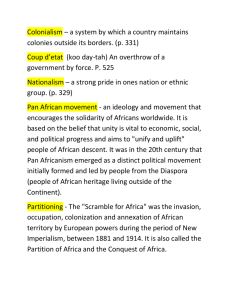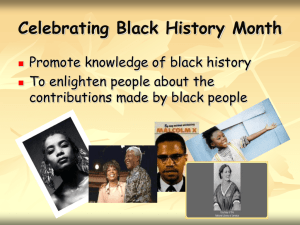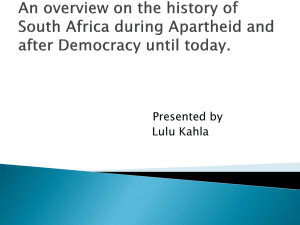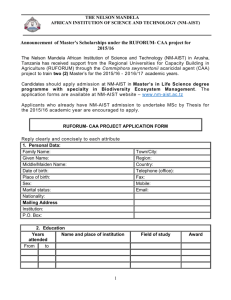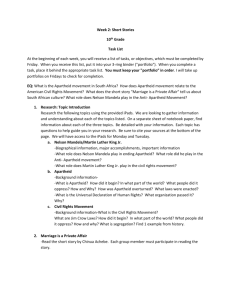Human Rights - Nelson Mandela
advertisement
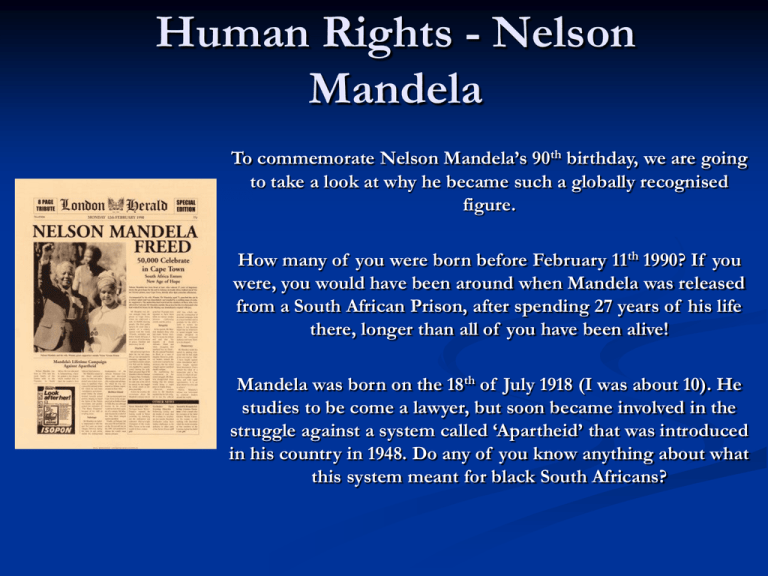
Human Rights - Nelson Mandela To commemorate Nelson Mandela’s 90th birthday, we are going to take a look at why he became such a globally recognised figure. How many of you were born before February 11th 1990? If you were, you would have been around when Mandela was released from a South African Prison, after spending 27 years of his life there, longer than all of you have been alive! Mandela was born on the 18th of July 1918 (I was about 10). He studies to be come a lawyer, but soon became involved in the struggle against a system called ‘Apartheid’ that was introduced in his country in 1948. Do any of you know anything about what this system meant for black South Africans? Human Rights – Nelson Mandela ‘Apartheid’ means ‘separateness.’ It was introduced by Dutch colonial settlers in 1948. Basically, it reduced the native population of South Africa to little more than slaves within their own country. Laws were introduced to legalize racial separation. Each child who was born in Apartheid South Africa was given a racial classification on their birth certificate, either Black, White, Coloured or Asian. Black people were not permitted to travel where they liked (and were constantly stopped by police and asked to provide identification). Black people could not live where they liked, but were instead herded into areas called ‘Bantustans,’ often the least desirable parts of their own country. Human Rights – Nelson Mandela Protest was outlawed. Anyone caught organising a demonstration, reading banned newspapers or speaking against the Apartheid system was in danger of being detained without trial, tortured, imprisoned, even sometimes murdered. However, Mandela’s group, the African National Congress committed itself to using non-violent means to protest against this system That is, until the Sharpeville Massacre in 1960. Human Rights – Nelson Mandela The Sharpeville Massacre took place on March 21st, 1960. Police opened fire on blacks demonstrating against the policies of the National Party government. 69 people were killed simply for expressing an opinion. This event was credited by Mandela as forcing the hand of his ANC organisation. They soon resorted to violent methods themselves. Though never targeting civilians, they began to blow up railway lines and other economic targets. Later, the Soweto Massacre was to have a similar effect on public opinion around the world…. The Soweto Uprising Young people had been forced to learn Afrikaans in school, the language of the Dutch settlers. They were not allowed to speak or learn in their own language. On March 21st 1976, school-children protesting the right to be taught in their own language were shot by police. 69 school-kids died. The day is now commemorated in South Africa as Youth Day. People around the world were outraged. But it was to be almost 20 years until the Apartheid system collapsed. At the time, Nelson Mandela was serving his time in prison for what the government called ‘terrorist’ activities. Human Rights – Nelson Mandela “During my lifetime I have dedicated myself to the struggle of the African people. I have fought against white domination, and I have fought against black domination. I have cherished the ideal of a democratic and free society in which all persons live together in harmony and with equal opportunities. It is an ideal which I hope to live for and to achieve. But if needs be, it is an ideal for which I am prepared to die.” Nelson Mandela’s speech from the dock, Pretoria Courthouse, 1964 Human Rights – Nelson Mandela Since being released in 1994, Mandela has received over 100 awards in recognition of the efforts he has made to bring peace and reconciliation to South Africa, and around the world. Think about some of the following questions; How would you respond if someone came to your town and removed all your rights, told you where you could travel, where you could work, what schools you could go to and which language you were permitted to speak? You could not even have relationships with who you chose! This powerpoint was kindly donated to www.worldofteaching.com http://www.worldofteaching.com is home to over a thousand powerpoints submitted by teachers. This is a completely free site and requires no registration. Please visit and I hope it will help in your teaching.


